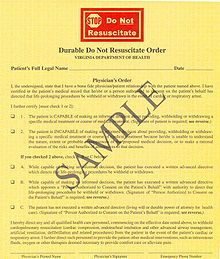Do not resuscitate meaning
What does do not resuscitate mean? What is the difference between a living will and a DNR? Who can sign a DNR? An order stating that a patient should not be revived.
Sometimes it also prevents other medical interventions.

DNRs are Do Not Resuscitate orders. I would not resesitate (how the heck DO you spell that?) beyond reasonable means. So, for instance, if her heart stops but you can use the paddles on her (defibulator- darn it Love All- is this a spelling test in disguise) and know you. S with patients that are DNR (do not resuscitate) meaning that if they are in a situation where life support is needed to keep them alive-they do not want it.
Do not resuscitate (DNAR) decisions explained - Which? A DNAR decision tells medical staff not to attempt to resuscitate you. There’s often confusion about how these decisions are made and when they should be used.

Though they are often used to prevent patients suffering. A do-not-resuscitate order, or DNR order, is a medical order written by a doctor. A DNR order is create or set up, before an emergency occurs.
It is meant as an instruction to avoid pointless further suffering , when all other treatment options have been used or explored. It is not intended as a way to remove long-term or elderly patients from hospital beds when used as intended - to minimise suffering. DNARs do not mean patients are denied other treatment or food and water. DNR means Do Not Resuscitate.
DNR orders are written instructions from a physician telling health care providers not to perform Cardiopulmonary Resuscitation (CPR). DNRs, DNARs, and DNACPRs are all abbreviations referring to an advance decision made by medical staff not to attempt cardiopulmonary resuscitation (CPR) on a patient who has stopped breathing, or whose heart has stopped. Do not intubate,” or DNI, means not to place a patient on a mechanical ventilator to breathe for him or her. Many patients who request the DNR status will also request to be DNI, but not always. Data demonstrates that this interpretation of the DNR status may not hold true in many hospitals, though.
But too often, the rigmarole is futile. The heart cannot be restarted because the patient is too frail, too weak and waning. Their cardiac arrest has not been caused by a reversible problem.
And we know that, particularly in the elderly, survival to discharge after inpatient CPR rarely exceeds (6).
So DNR status should not have a large impact on mortality. DNR does NOT mean ‘do not care for this patient’: “When health care professionals speak to patients and family members about DNRs, all too often the family believes we will abandon care and stop all treatment. Often all they hear is the “not” in “do not resuscitate. It is a common misconception that ‘do not attempt resuscitation’ orders mean a patient’s care is halted to allow them to die. A decision to not resuscitate a person shouldn’t be made in a way that discriminates against them unfairly on any grounds.
The doctors should have considered the individual, their health and what is in their best interests. A do - not - resuscitate (DNR) order can also be part of an advance directive. Hospital staff try to help any patient whose heart has stopped or who has stopped breathing.
They do this with cardiopulmonary resuscitation (CPR). A DNR is a request not to have CPR if your heart stops or if you stop breathing.
Comments
Post a Comment